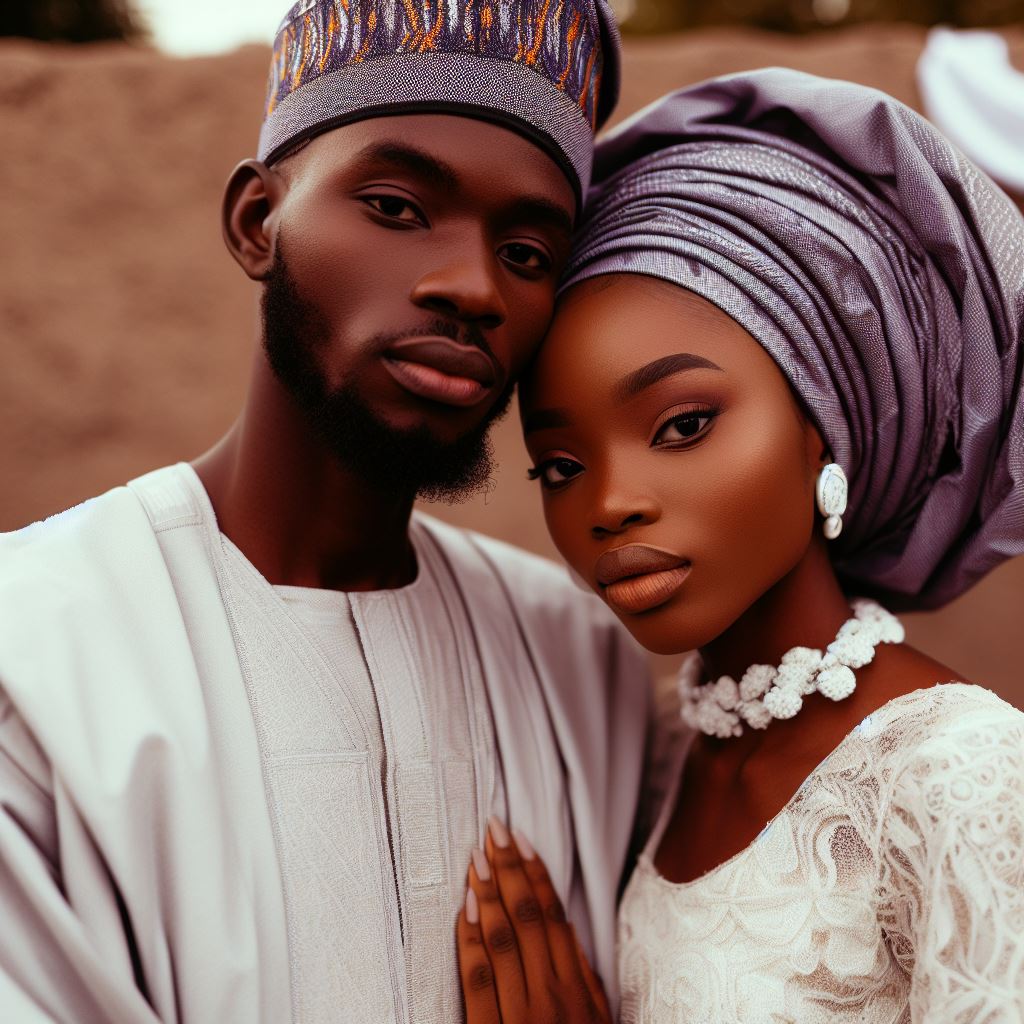Introduction
Definition of Intimacy in Islamic Marriages
Intimacy in Islamic marriages extends beyond physical closeness.
It encompasses emotional, spiritual, and psychological connection, fostering a profound bond between spouses.
Importance of Intimacy in a Marital Relationship
Intimacy is the lifeblood of a thriving marital relationship.
It nurtures love, trust, and compassion while strengthening the marital bond.
Purpose of the Blog Post
The purpose of this blog is to guide Nigerian couples in enhancing intimacy within their Islamic marriages.
We will delve into various aspects of intimacy, offering practical insights and advice to help couples grow closer and build lasting, fulfilling relationships.
Read: Islamic Pre-Marital Courses: Why and Where in Nigeria?
Understanding Islamic Teachings on Intimacy
Overview of Islamic teachings regarding intimacy
- Islamic teachings recognize the importance of intimacy in a marital relationship.
- Islam encourages a healthy and fulfilling intimate life between husband and wife.
- It is considered a means of strengthening the bond and bringing happiness to the spouses.
- Quran and Hadith contain guidelines on how couples should approach intimacy in their marriages.
Importance of consent and communication in Islamic marriages
- In Islam, consent is essential before engaging in any form of intimacy.
- Both spouses must willingly agree to engage in intimate acts without any form of coercion.
- Effective communication between husband and wife plays a vital role in achieving consent.
- Open dialogue helps in understanding each other’s desires, boundaries, and expectations.
- Islam emphasizes the importance of mutual respect and consideration in intimate matters.
Role of physical and emotional connection in Islamic marriages
- Islamic teachings recognize the significance of both physical and emotional connection in marriages.
- Physical intimacy is not limited to sexual acts but includes affection, cuddling, and expressing love.
- Islam encourages spouses to engage in foreplay, ensuring both partners are satisfied and fulfilled.
- Emotional connection builds a strong foundation by nurturing love, trust, and understanding.
- Islam encourages couples to express affection, appreciation, and gratitude to strengthen emotional bonds.
Generally, understanding Islamic teachings on intimacy is essential for Nigerian couples.
Islamic teachings emphasize the importance of consent and effective communication in marital relationships.
Consent should be obtained willingly, without coercion, and clear communication ensures both spouses understand each other’s desires and boundaries.
Physical and emotional connection are equally important in Islamic marriages.
It goes beyond sexual acts and includes affection and expressions of love.
By following these teachings, Nigerian couples can cultivate a healthy and fulfilling intimate life, strengthening their bond and bringing happiness to their marriage.
Read: Rights of Children in Islamic Matrimony: A Nigerian Lens
Factors Influencing Intimacy in Islamic Marriages
Intimacy in Islamic marriages is influenced by various factors, including cultural, societal, psychological, as well as misconceptions and challenges faced by Nigerian Muslim couples.
Cultural and Societal Factors Affecting Intimacy
- Patriarchal norms: The dominance of patriarchal norms within Nigerian society can affect intimacy as it may limit women’s sexual autonomy and contribute to power imbalances.
- Modesty and privacy: Cultural practices emphasizing modesty and privacy can affect the level of intimacy between spouses, often inhibiting open discussions about sexual desires and needs.
- Extended family dynamics: The presence of extended family members in the household can limit privacy and hinder couples from fully connecting and exploring intimacy.
Psychological Factors Influencing Intimacy
- Emotional connection: Building an emotional connection is crucial for intimacy. Psychological factors such as trust, communication, and empathy play a significant role in fostering emotional intimacy.
- Body image and self-esteem: Negative body image and low self-esteem can affect sexual confidence and hinder the ability to be vulnerable and intimate with a partner.
- Stress and mental health: Stress, anxiety, and mental health issues can significantly impact intimacy by reducing desire, creating performance pressure, or affecting emotional stability.
Misconceptions and Challenges Faced by Nigerian Muslim Couples
- Lack of sexual education: Limited sexual education in the Nigerian Muslim community often leads to misconceptions, inhibits open conversations about intimacy, and may create unrealistic expectations.
- Religious and cultural taboos: Religious and cultural taboos surrounding sex in Nigeria can create reluctance to explore and discuss intimate matters, further marginalizing couples.
- Gender roles and expectations: Traditional gender roles and expectations can affect intimacy by assuming specific roles and responsibilities, limiting individual expression and freedom in the relationship.
- Influence of social media: The influence of social media can create unrealistic expectations, body image issues, and comparison within the relationship, impacting intimacy.
- Lack of open communication: Inadequate communication between spouses can hinder intimacy, as partners may struggle to express their desires, needs, and concerns openly.
Essentially, various factors influence intimacy in Islamic marriages in Nigeria.
Cultural and societal norms, psychological factors, as well as misconceptions and challenges, all play a role in shaping intimacy within these relationships.
By acknowledging and addressing these factors, Nigerian Muslim couples can strive for a more fulfilling and intimate marriage based on understanding, trust, communication, and mutual respect.
Read: Challenges of Interfaith Marriages: Islamic Views & Nigeria

Practical Guidance for Nigerian Muslim Couples
In this section, we will provide practical guidance for Nigerian Muslim couples to enhance intimacy in their marriages.
Building emotional connections and understanding is crucial for a fulfilling marital relationship.
Here are some techniques to help you achieve this:
Building emotional connections and understanding
- Communication techniques for expressing needs and desires: Effective communication is key to expressing your needs and desires to your partner in a healthy and respectful manner. Clearly articulate your feelings and listen actively to your spouse.
- Cultivating emotional support and empathy: Nurture a supportive environment where both partners feel comfortable sharing their emotions. Empathy allows you to better understand each other’s perspectives and deepen your emotional bond.
- Nurturing trust and respect: Trust and respect are the foundation of any successful marriage. Foster an atmosphere of trust by being reliable and dependable, and show respect by valuing each other’s opinions and boundaries.
Enhancing physical intimacy within Islamic boundaries
Physical intimacy is an important aspect of marital relationships, and it can be enhanced while adhering to Islamic principles.
Here are some ways to promote physical intimacy within Islamic boundaries:
- Importance of sexual education within marriages: Educate yourselves about the physical aspects of intimacy to ensure a healthy and fulfilling sexual relationship. Seek knowledge from reputable Islamic sources or seek guidance from qualified professionals.
- Exploring halal ways to express physical affection and desire: Islam encourages physical affection between spouses. Explore permissible ways, such as gentle touch, hugs, and kisses, to express love and desire towards your partner within the boundaries of Islamic teachings.
- Promoting healthy sexual relationships based on mutual consent: Consent is essential in any intimate relationship. Prioritize open and honest communication about each other’s boundaries and desires. Mutual consent ensures a safe and enjoyable experience for both partners.
Overcoming challenges and seeking help
Challenges may arise when it comes to intimacy, but it is essential to seek help and overcome them. Here are some steps to take:
- Addressing cultural taboos and stigmas: In some Nigerian communities, discussing intimacy may be considered taboo. Break the silence and openly address these cultural taboos to create a safe space for discussing intimacy within Islamic guidelines.
- Consulting religious scholars for guidance: Islamic scholars can provide guidance on enhancing physical intimacy within Islamic boundaries. Seek their advice to better understand the teachings and find clarity on any concerns or doubts.
- Seeking professional counseling if needed: If intimacy-related difficulties persist, seeking professional counseling can be beneficial. Trained counselors can help you navigate challenges, provide guidance, and offer strategies to improve your marital intimacy.
In essence, building emotional connections, enhancing physical intimacy, and overcoming challenges are crucial steps in cultivating a strong and fulfilling marital relationship.
By following these practical guidance points, Nigerian Muslim couples can nurture a loving and intimate bond within the boundaries of Islam.
Read: The Prophetic Tradition: Marriage Lessons from Hadiths
Conclusion
Recap the importance of intimacy in Islamic marriages
Intimacy is a vital element in Islamic marriages as it fosters emotional and physical connection between spouses.
Nigerian Muslim couples should understand that intimacy is a religious duty in Islam and should be given utmost importance and attention.
They should actively communicate, express love, and engage in physical affection to strengthen their marital bond.
Nurturing intimacy requires mutual respect, understanding, and willingness to explore each other’s needs.
Through continuous effort and open communication, couples can successfully cultivate a fulfilling and satisfying intimate relationship.
Final thoughts and key takeaways
Intimacy plays a crucial role in Islamic marriages, promoting emotional connection, trust, and love between spouses.
Nigerian Muslim couples are encouraged to prioritize and nurture their intimacy, understanding that it is a religious obligation and essential for a happy and stable marriage.
By embracing the principles of Islamic teachings and actively working towards cultivating a healthy intimate relationship, couples can experience a deeper and more fulfilling connection with their partners.




